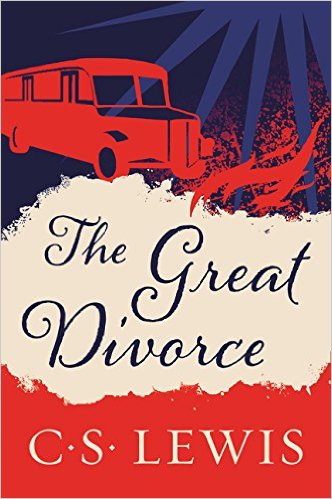 It may come as some surprise that this is only my second time through one of Mr. Lewis’ highly acclaimed classics; the first journey having been in the pages of A Grief Observed. Although the two titles vary in category (the fiction of this recent read versus the non-fiction of the latter), the brilliance of Lewis’ writing shines forth regardless of category. So much so, that upon completing this book, I hesitated to attempt to review it—there’s no way my words could do it much justice.
It may come as some surprise that this is only my second time through one of Mr. Lewis’ highly acclaimed classics; the first journey having been in the pages of A Grief Observed. Although the two titles vary in category (the fiction of this recent read versus the non-fiction of the latter), the brilliance of Lewis’ writing shines forth regardless of category. So much so, that upon completing this book, I hesitated to attempt to review it—there’s no way my words could do it much justice.
The premise of the book, according to its description: “The writer finds himself in Hell boarding a bus bound for Heaven. The amazing opportunity is that anyone who wants to stay in Heaven, can…Lewis’ revolutionary idea is the discovery that the gates of Hell are locked from the inside.”
The composition is 146 pages and I finished it in one weekend. I couldn’t put it down. Though Lewis himself states in the introduction that the work is not “even a guess or a speculation at what may actually await us”, the follower of Christ can plainly see his faith interwoven in the paragraphs. This self-described “fantasy” story has much to say about the false idols, injuries, pride, and folly of those repulsed by the offer of a heavenly residence at only the cost of letting go of the past.
If you are looking for a short piece of fiction that is masterfully written, engaging and thought-provoking, this is it. The majority of the time is staged in a breathtaking mountainside country, as the writer witnesses encounters between the grungy ghosts from Hell and the majestic “Solid People” (those who have accepted free entrance into Heaven). The intimate conversations between souls—invitations from the Solid People to trade Hell for permanent placement in Heaven, and the rebuttals from the ghosts who cannot seem to get out of their own way—is simply riveting. At first reflection, we might ask why people would even think twice about choosing Hell over Heaven, but in these conversations we catch a glimpse of a stark reality: the choice has nothing to do with our heads and everything to do with our hearts.
When I finished this book, I couldn’t help but say to myself, Jesus, help me remember the worth of Heaven when I get there.
A few of my favorite quotes:
‘Ah, the Saved…what happens to them is best described as the opposite of a mirage. What seemed, when they entered it, to be the vale of misery turns out, when they look back, to have been a well; and where present experience saw only salt deserts, memory truthfully records that the pools were full of water.’
‘The choice of every lost soul can be expressed in the words “Better to reign in Hell than serve in Heaven.” There is always something they insist on keeping even at the price of misery.”
‘There have been men before now who got so interested in proving the existence of God that they came to care nothing for God himself…as if the Good Lord had nothing to do but exist! There have been some who were so occupied in spreading Christianity that they never gave a thought to Christ.’
‘All that are in Hell, choose it. No soul that seriously and constantly desires joy will ever miss it. Those who seek will find. To those who knock it is opened.’
I grew so enthralled by the characters; emotions stirred as each arrived at the inevitable crossroads of choosing to stay in Heaven or get back on the bus. You’d do well to read this book, if only to become more sensitive to the stumbling blocks people put up when it comes to the topic of free salvation in Jesus, and to become more graceful in handling them as the Solid People were. As Lewis puts it, “I believe, to be sure, that any man who reaches Heaven will find that what he abandoned (even in plucking out his right eye) has not been lost: that the kernel of what he was really seeking even in his most depraved wishes will be there, beyond expectation, waiting for him in the ‘High Countries’.”
About the Author: C.S. Lewis
 Clive Staples Lewis (1898-1963) was one of the intellectual giants of the twentieth century and arguably one of the most influential writers of his day. He was a Fellow and Tutor in English Literature at Oxford University until 1954, when he was unanimously elected to the Chair of Medieval and Renaissance Literature at Cambridge University, a position he held until his retirement. He wrote more than thirty books, allowing him to reach a vast audience, and his works continue to attract thousands of new readers every year. His most distinguished and popular accomplishments include Mere Christianity, Out of the Silent Planet, The Great Divorce, The Screwtape Letters, and the universally acknowledged classics The Chronicles of Narnia. To date, the Narnia books have sold over 100 million copies and been transformed into three major motion pictures. (bio from Amazon)
Clive Staples Lewis (1898-1963) was one of the intellectual giants of the twentieth century and arguably one of the most influential writers of his day. He was a Fellow and Tutor in English Literature at Oxford University until 1954, when he was unanimously elected to the Chair of Medieval and Renaissance Literature at Cambridge University, a position he held until his retirement. He wrote more than thirty books, allowing him to reach a vast audience, and his works continue to attract thousands of new readers every year. His most distinguished and popular accomplishments include Mere Christianity, Out of the Silent Planet, The Great Divorce, The Screwtape Letters, and the universally acknowledged classics The Chronicles of Narnia. To date, the Narnia books have sold over 100 million copies and been transformed into three major motion pictures. (bio from Amazon)

